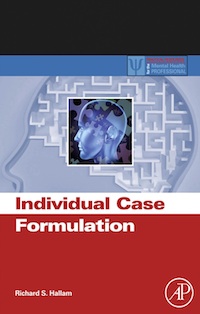Richard S Hallam, March 2013
Academic Press | ISBN 9780123982797 | Hardback and eBook
www.store.elsevier.com
Pages: 296 | Dimensions: 229 x 152
Individual Case Formulation presents formulation as a process that can be taught systematically to trainee therapists. The book first reviews, critiques and compares approaches to case formulation in psychotherapy and then proposes a functional/systemic framework that focuses on difficulties as defined by the client. It emphasizes constructive solutions to problems rather than symptom reduction. The book attempts to integrate any well founded theoretical principle or evidence base while respecting the role of the conceptual reasoning, judgment, and expertise of the therapist. In an extended appendix, there is a guide for conducting an assessment interview, developing a provisional formulation within an explicit conceptual framework, and for developing and testing it in practice. The process is illustrated with annotated transcripts of interviews and therapy sessions.

1. Formulation - the main issues
2. Conceptual frameworks for case formulation
3. Evidence-based practice: Diagnostic and transdiagnostic approaches
4. Theory and evidence in individual case formulation
5. The process of reasoning in individual case formulation
6. Narrative and textual analysis in formulation
7. Formulation skills and the therapeutic relationship
8. A functional/systemic framework for case formulation
9. Future prospects for individual case formulation
Appendix: Guidelines for assessment and constructing an individual case formulation
![]() Review in Clinical Psychologist (Australia), November, 2013
Review in Clinical Psychologist (Australia), November, 2013
![]()
All content © Richard Hallam 2009-2022
